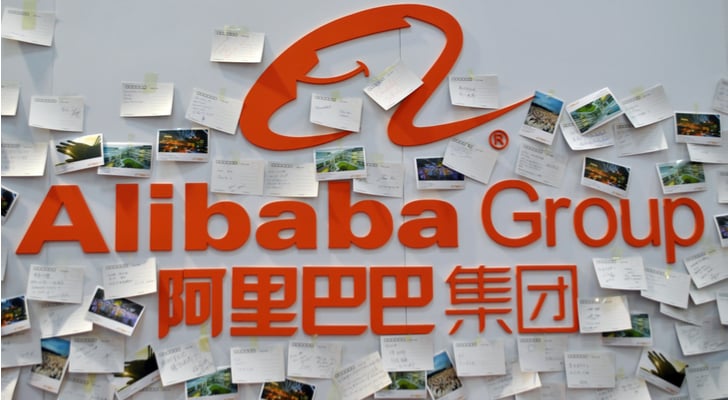As impressive as the 2017 performance by Alibaba Group Holding Ltd (NYSE:BABA) was, it’s important to remember that last year’s gains were an anomaly relative to the long-term pattern of Alibaba stock. BABA stock really didn’t move for about two and a half years after its 2014 IPO.
It’s resumed that relatively sideways trading over the past few months: BABA trades not far above August highs.
It’s not that difficult to believe that support might eventually give way in the near term. Investors have stepped in repeatedly when BABA nears $170. At some point, however, those buyers may not be there.
The easy bull case for Alibaba stock is that it’s “the Amazon.com, Inc. (NASDAQ:AMZN) of China,” a slam-dunk play on e-commerce spending in that rapidly growing economy. But the truth, as always, is more complicated, and risks are rising. And with Alibaba now valued at nearly half a trillion dollars, investors shouldn’t be so cavalier about taking on those risks.
Regulatory Concerns and Reputational Risk for BABA Stock
Just last week I argued that, at current levels, Alibaba stock needed expansion into the West to drive its stock higher. The very next day, the Office of the U.S. Trade Representative called out Alibaba’s Taobao marketplace as a “Notorious Market.” The problem in a nutshell is the exceedingly high number of counterfeit products on the Alibaba platform.
Alibaba itself announced its disagreement with the decision, and the U.S. government admitted that the company had taken some steps toward fighting piracy. But reputational risk remains a key issue here, as seen in the OTR’s decision – and elsewhere.
Earlier this month, Alibaba affiliate Ant Financial had its acquisition of MoneyGram International Inc (NASDAQ:MGI) squashed due to national security concerns. Alibaba’s cloud business, which I’ve long argued could be a “secret weapon” for BABA stock, faces similar concerns from Western corporations.
The Chinese opportunity admittedly is huge. But rival
JD.com Inc(ADR) (NASDAQ:JD) is taking market share, and from here simply looks like a better pick. And that company actually owns its inventory, unlike Alibaba. A partnership with Wal-Mart Stores Inc (NYSE:WMT) that in particular gives it much more control over what exactly is sold on the platform and avoids the counterfeit problem that has plagued Taobao for years.
I still don’t believe China alone drives much, if any, incremental upside in Alibaba stock from current levels. And the OTR’s decision highlights that BABA stock could have a bumpy road at best as the company tries to enter Western markets.
Accounting and Financial Risk
Simply from the perspective of BABA stock, there are risks as well. Investors don’t actually own the Alibaba business, but rather shares in a Cayman Islands-based variable interest entity entitled to a portion of the company’s profits. U.S. investors, in the event of a dispute over those profits, have little, if any, recourse.
The use of the so-called VIE’s has led to long-running concerns about the company’s accounting. Alibaba’s reported sales figures look potentially inflated. One short seller has compared the company to Enron. And while that latter accusation seems a bit inflated itself, there are real concerns here.
There’s a reason that BABA stock long has been a target of short sellers. The concerns surrounding the numbers and the corporate structure are real.
BABA Stock Isn’t Worth It
Admittedly, risks are present in all stocks, particularly those in emerging markets. And there’s a lot to like about Alibaba, which is one reason why I recommended BABA stock for most of last year.
But the stock also gained 81% in 2017, adding over $200 billion in market value. And the bull case just looks tougher from here. This week, Jefferies initiated Alibaba stock with a ‘buy’ rating and a $240 price target. But even that case looks highly optimistic.
The firm believes the company can hit its GMV (gross merchandise volume) target of 1 trillion RMB by 2020 despite JD’s share gains. It argues Alibaba can increase ‘monetization’ of those sales even though there’s little reason to believe Alibaba’s take rate should rise over that time.
Notably, the model assumes Alibaba will have two billion customers worldwide in less than two decades.
That’s a huge number; and it’s a number, even given the growth of the Chinese middle class, that assumes some level of worldwide expansion. Again, I simply don’t think Alibaba is getting to that point, or close. It will need to dramatically improve its business to expand much outside of China and it will face increasing competition in-country.
Meanwhile, there’s still macro risk in that economy, given a two-decade expansion and continuing questions about the veracity of Chinese government statistics. There’s the accounting and corporate issues. There’s a lot of risk to take on for a bull case that seems rather optimistic. It’s just not a bet worth taking anymore.
As of this writing, Vince Martin has no positions in any securities mentioned.

